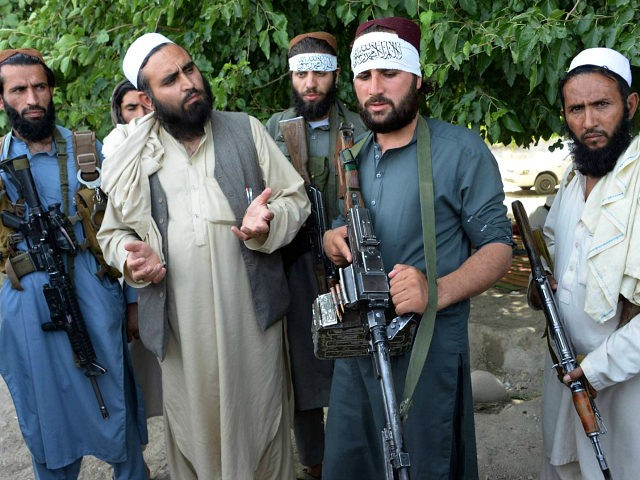It is imperative for the United States to “reconcile” with the Afghan Taliban so that the American military can withdraw its troops from Afghanistan in a “decent way” and leave behind an “acceptable” regime, China’s state-run Global Times argued in an editorial published Monday.
China shares a border with Afghanistan. Jihadi members of China’s Uighur Muslim minority are known to train with Afghan Taliban and al-Qaeda terrorists in the region.
In the op-ed, Zhou Rong, a senior fellow at the Renmin University’s Chongyang Institute for Financial Studies in China, noted:
The US war in Afghanistan has become the longest-running in American history. More than 2,400 US service personnel and about $1 trillion has been lost. For Pakistan, those numbers are 7,000 and $330 billion. It is urgent Washington reconcile with the Afghan Taliban so that US forces can withdraw from Afghanistan in a decent way with a regime acceptable, if not necessarily favorable, to the US. Otherwise, the nearly 18 years of US military presence in Afghanistan would be in vain.
The help of Islamabad is essential for Washington to reach an accommodation with the Taliban.
China’s top ally Pakistan “remains the most influential foreign force on the Afghan Taliban,” the Global Times acknowledged, noting that the terrorist group has its headquarters in Quetta, the capital of Pakistan’s volatile Balochistan province.
The editorial comes amid intensified efforts by U.S. President Donald Trump’s administration to strike a peace deal with the Afghan Taliban.
Breitbart News recently reported the Trump administration has described victory in the 17-year-old war as reinstalling the same Afghan Taliban jihadist group American forces overthrew in late 2001.
The Trump administration has made “reconciliation” between the Afghan Taliban and Kabul the primary goal of its strategy to end the conflict.
In June, U.S. Secretary of State Mike Pompeo acknowledged that everything, including the presence of U.S.-NATO-led troops, is up for discussion in Afghanistan.
Marking a significant shift in American policy long sought by the Taliban, the Trump administration is engaging directly with the jihadi group to end the Afghanistan war.
“Both the Defense Department and State Department are acting as if withdrawal is on the table, sooner or later,” Thomas Joscelyn from the FDD think-tank recently told NBC News.
According to the latest Global Terrorism Index by the Institute for Economics and Peace think-tank, Afghanistan was the deadliest country for jihad last year, mainly due to the Taliban.
Early this month, President Trump sent a letter to the Pakistani prime minister urging Islamabad to assist the United States “in achieving a negotiated settlement of the Afghan war,” Pakistan’s foreign ministry revealed.
Pakistan welcomed the request, assuring “the US side of Pakistan’s steadfast support for a negotiated settlement in war-torn Afghanistan,” Mohammad Faisal, a spokesperson for Pakistan’s foreign office, wrote on Twitter last Tuesday.
Pentagon officials have long accused Islamabad of willingly serving as a sanctuary for terrorist groups carrying out attacks in Afghanistan from Pakistani soil, namely the Afghan Taliban and its Haqqani Network allies.
Islamabad has repeatedly denied the claims. Nevertheless, the Trump administration has suspended hundreds of millions in aid to Pakistan over Islamabad’s reluctance to take decisive action against the Afghan Taliban and its allies.
As early as last week, U.S. officials said that Pakistan has failed to change its behavior when it comes to lending support to terrorist groups intent on killing and maiming American troops and their allies in Afghanistan.
Marine Corps Lt. Gen. Kenneth McKenzie Jr., the new top commander of U.S. troops in the Middle East and Afghanistan, told lawmakers during his confirmation hearing last Tuesday that violent extremist organizations (VEOs) continue to operate freely on Pakistani soil, adding:
Taking concrete steps that deny VEO safe havens in Pakistan, as well as VEO freedom of movement from Pakistan to Afghanistan, remains an important ask that Pakistan needs to fulfill. Pakistan must leverage their influence over the Taliban leadership to help compel them to come to the table for reconciliation negotiations.
The top U.S. general conceded that Pakistan is in a position to play a significant role in facilitating negotiations between the Taliban and Kabul, telling lawmakers: “I would welcome that development. At this time, however, Pakistan does not appear to be using the full extent of its influence to encourage the Taliban to come to the table. We continue to see the Taliban being utilized as a hedge against India rather than as part of a stable, reconciled Afghanistan.”
The United States needs Pakistan to end the war in Afghanistan, Global Times stressed.
Although the Taliban has long maintained that U.S.-NATO forces must completely pull out from Afghanistan before they agree to negotiate an end to the war, retired U.S. Army Col. Chris Kolenda argued in August that the terrorist group may be willing to allow a residual American military presence in the country.
Gen. McKenzie believes the Afghanistan war is still at a stalemate and warned against an abrupt withdrawal of American forces or change in strategy. China has participated in failed efforts to bring the Taliban to the negotiation table.

COMMENTS
Please let us know if you're having issues with commenting.